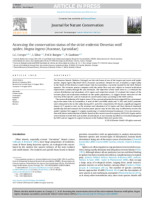Conservation status of the wolf spider Hogna ingens

The Desertas Islands (Madeira, Portugal) are the sole home of one of the largest and rarest wolf spiderspecies, Hogna ingens (Blackwall 1857) (Araneae, Lycosidae).
Despite its size, it inhabits a single valleyin the North of the Deserta Grande Island, Vale da Castanheira, currently invaded by the herb Phalarisaquatica. This invasive species competes with the native flora and was subject to several eradicationexperiments, namely through fire and chemicals. The objectives of this work were to: (1) estimate thecurrent distribution and abundance of H. ingens and respective trends; (2) evaluate the impact of theinvasive plant and eradication methods on the spider population; (3) suggest future measures for therecovery of the species; and (4) evaluate its conservation status according to the IUCN criteria.
The current distribution of H. ingens covers 23 ha, a recent reduction from its original 83 ha, correspond-ing to the entire Vale da Castanheira. A total of 4447 and 4086 adults and 71,832 and 24,635 juvenileswere estimated to live in the valley during 2011 and 2012, respectively. We found a significant negativeimpact of P. aquatica cover on the presence and abundance of H. ingens and that chemical treatmentspecifically directed towards the invasive plant species may be the only way to effectively recover thespider’s habitat.
We suggest (1) regular monitoring; (2) extend chemical treatments; (3) ex-situ conserva-tion with future reintroduction of adults. Based on the current area of occupancy (AOO) of H. ingens and itsrecent decline in both AOO and number of individuals, it was recently classified as Critically Endangeredby IUCN and we suggest its urgent inclusion in the Habitats Directive species lists.







